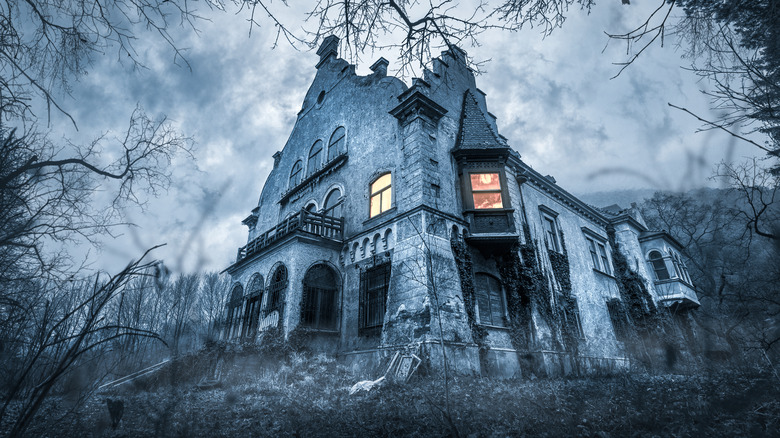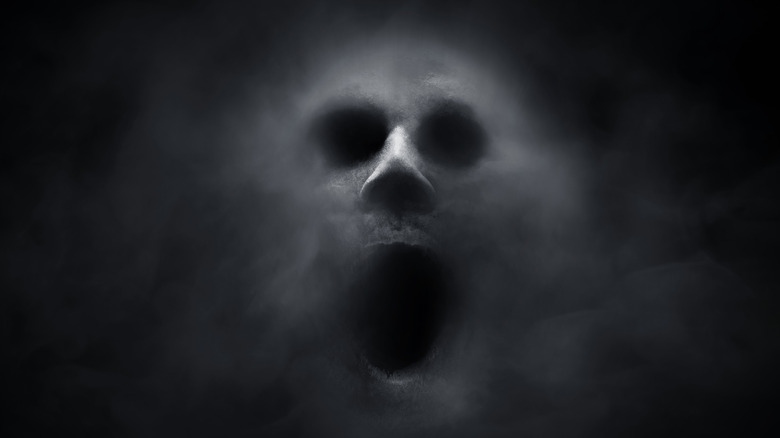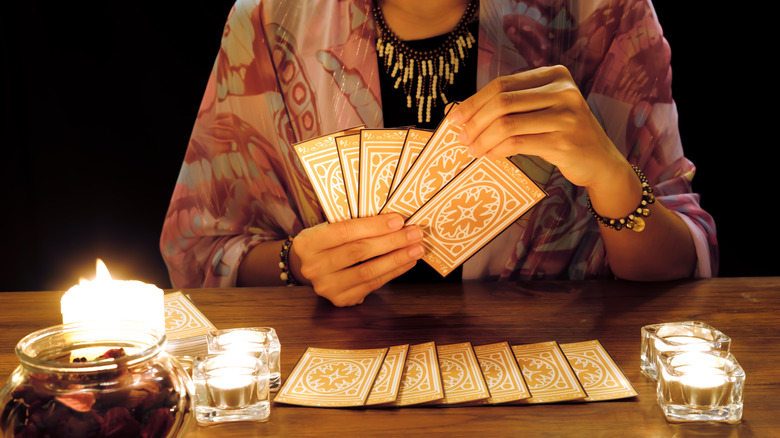The Messed Up Truth About Horror Novelist Shirley Jackson
There's more to author Shirley Jackson than her well-known short story about a small town's violent annual ritual, "The Lottery." When the piece was published in the June 26, 1948, issue of The New Yorker, the public responded in confusion and revulsion, according to the publication, generating the most mail the magazine ever received after publishing a fictional piece. The story, which recounted a lottery where the winner is stoned to death, received comments such as "outrageous," "gruesome," or "utterly pointless." Jackson would later say at lectures — captured in a published account, titled "Biography of a Story" — that out of more than 300 letters, just 13 were supportive "and they were mostly from friends." When Jackson biographer, Ruth Franklin, reviewed those missives, she found that Jackson's story did anger some individuals, who canceled their subscription to The New Yorker and called her names. Most, though, were simply puzzled by the plot and what it meant.
The story has become iconic in American literature, transformed into theatrical, ballet, radio, and TV presentations. It even got a nod during a Season 3 "The Simpsons" episode ("Dog of Death"). If you studied "The Lottery" in school, you've probably looked at its major themes, including the violent nature of humans, the ironclad hold tradition maintains, and the power of conformity shown in this deceptively simple tale (via ThoughtCo). Jackson, herself, is like her story, too: On the surface she's a writer of horror, but go deeper, and you'll find much more.
Her mother's disappointment fueled her writing
Shirley Jackson's mother, Geraldine, never approved of the writer, according to Bustle. Even when she was young, her mother would criticize the way she dressed or did her hair. Her mother disagreed with most of her choices, from Jackson's fascination of the occult and the career she pursued to the man she married, Stanley Edgar Hyman. In fact, her parents didn't even attend their wedding, reported Publisher's Weekly.
Even as her daughter achieved success, Geraldine remained discontent with her child. When Time Magazine positively reviewed Jackson's book, "We Have Always Lived in the Castle," Geraldine wrote in a letter to her daughter that she looked terrible in the photo. "If you don't care what you look like or care about your appearance, why don't you do something about it for your children's sake, for your husband's sake ... I have been so sad all morning about what you have allowed yourself to look like," quoted Bustle.
As a youngster, Jackson felt isolated and began to write and read instead of socializing with other children, something her mother hated, according to Study. But these practices would set the foundation for her career as a writer.
Jackson's love of mystical things
Besides "The Lottery," Jackson left a cannon of work behind. Her 1959 novel, "The Haunting of Hill House," created a standard for haunted house tales. "All others stand in its shadow," novelist Paul Tremblay told The Guardian. Stephen King also appreciates the work, calling it one of "the only two great novels of the supernatural in the last 100 years." (The other one is Henry James' "The Turn of the Screw," in case you wondered). According to Screenrant, the story was adapted three times, twice as movies and, most recently, as a 10-part series in 2018 on Netflix.
The chilling book, a finalist for the National Book Award, and others like her final novel, "We Have Always Lived in the Castle," capitalized on her long love of the macabre. Jackson enjoyed learning about ghosts, magic, and a sundry of mystical things. She always had a collection of black cats in her home — and told her husband they had less than the actual amount. He couldn't tell the difference since all the cats looked the same. She also believed that houses possessed the energy of past occupants and that, in a way, made the homes alive (per The Glinda Factor).
The Shirley Jackson Awards, established in 2007 by her estate, continues the author's legacy with its yearly recognition to writers who use psychological suspense, horror, or dark fantasy.
A horror writer who also wrote humor
Shirley Jackson often submitted comic writings to women's magazines about her harried existence as a mother and wife. She moved to North Bennington, Vermont, in 1945, when her husband got a teaching job at Bennington College. While the writer embraced her domestic life there, she could see the humor in it and contributed essays and fiction based on her life to publications such as "Good Housekeeping," according to Write or Die Tribe. She also wrote two memoirs, "Life Among the Savages" and "Raising Devils," about her experiences parenting four children. Her son Laurence is quoted on the website about the powers of her multitasking: "She was always writing, or thinking about writing, and she did all the shopping and cooking, too. The meals were always on time."
Her writings, especially her two books, skewer the 1950s attitude that beatified homemakers. It was a position Jackson struggled with, especially since her husband reportedly had multiple affairs and seemingly controlled her life; something that contributed to Jackson's unhappiness and may have added to her battles with alcoholism and agoraphobia. "Part of what Jackson mocks is her own ineptness at being a housewife — and, implicitly, the expectation that every woman belongs in that role," said Jackson biographer, Ruth Franklin, to The Guardian. "She pokes fun also at the idea that her children ought to be at the center of her universe, confessing her desire at times to leave them behind and check into a hotel."
'A practicing amateur witch'
While attending college at Syracuse University, Shirley Jackson became intrigued with witchcraft and began studying it. Her books sometimes depict her interest — for example, "Life Among Savages" mentions some witch history and tools, such as grimoires, according to Publisher's Weekly. She would even joke about her "magical" talents, teasing that publisher Alfred A. Knopf broke his leg while skiing in Vermont because of her spells; her husband had a contract dispute with him at the time. Her book, "The Road Through the Wall," also featured jacket text that said she was "perhaps the only contemporary writer who is a practicing amateur witch." Adding to all this mythology was the fact that Jackson would sometimes read tarot cards for family and friends.
Biographer Ruth Franklin said in The New Yorker that she used these stories as a "way of embracing and channeling female power at a time when women in America often had little control over their lives."
Jackson was called 'Virginia Werewoolf'
Critics dismissed Shirley Jackson as a mere horror writer, calling her "Virginia Werewoolf," according to The New Yorker. The Associated Press even asserted that "Miss Jackson writes not with a pen, but with a broomstick," according to the Evening Standard.
Even today's reviewers harshly judge Jackson's work. When the Library of America published a book featuring Jackson's writings, Malcolm Jones in Newsweek, wrote, "Shirley Jackson? A writer mostly famous for one short story, 'The Lottery.' Is LOA about to jump the shark?" He later deemed her not "a bad writer," but others deserved a publication revival more than her.
Even her husband commented after she died. "She received no awards or prizes, grants or fellowships — her name was often omitted from lists on which it clearly belonged," he said, according to Culture Trip. Still, Jackson wrote six novels, two memoirs, and more than 200 short stories before her death in 1965, at the age of 48 (via the Evening Standard).





